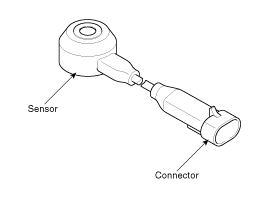 Hyundai Sonata: Knock Sensor (KS). Description and Operation
Hyundai Sonata: Knock Sensor (KS). Description and Operation
Description
Knocking is a phenomenon characterized by undesirable vibration and noise
and can cause engine damage. Knock Sensor (KS) is installed on the cylinder
block and senses engine knocking.
When knocking occurs, the vibration from the cylinder block is applied
as pressure to the piezoelectric element. When a knock occurs, the sensor produces
voltage signal. The ECM retards the ignition timing when knocking occurs. If
the knocking disappears after retarding the ignition timing, the ECM will advance
the ignition timing. This sequential control can improve engine power, torque
and fuel economy.

 Camshaft Position Sensor (CMPS). Repair procedures
Camshaft Position Sensor (CMPS). Repair procedures
Inspection
1.
Check the signal waveform of the CMPS and CKPS using the GDS.
Specification:
Refer to “Wave Form”
...
 Knock Sensor (KS). Specifications
Knock Sensor (KS). Specifications
Specification
Item
Specification
Capacitance (pF)
850 ~ 1,150
...
See also:
Speakers. Repair procedures
Inspection
1.
Troubleshooting for Speaker
(1)
Basic inspection of speaker
Inspect the sound from speaker after verifying that ...
Clutch Pedal. Repair procedures
Removal
Do not spill brake fluid on the vehicle; it may damage the paint
if brake fluid does contact the paint, wash it off im ...
Windshield washers
In the OFF position, pull the lever gently toward you to spray washer fluid on
the windshield and to run the wipers 1-3 cycles.
Use this function when the windshield is dirty.
The spray and wi ...
